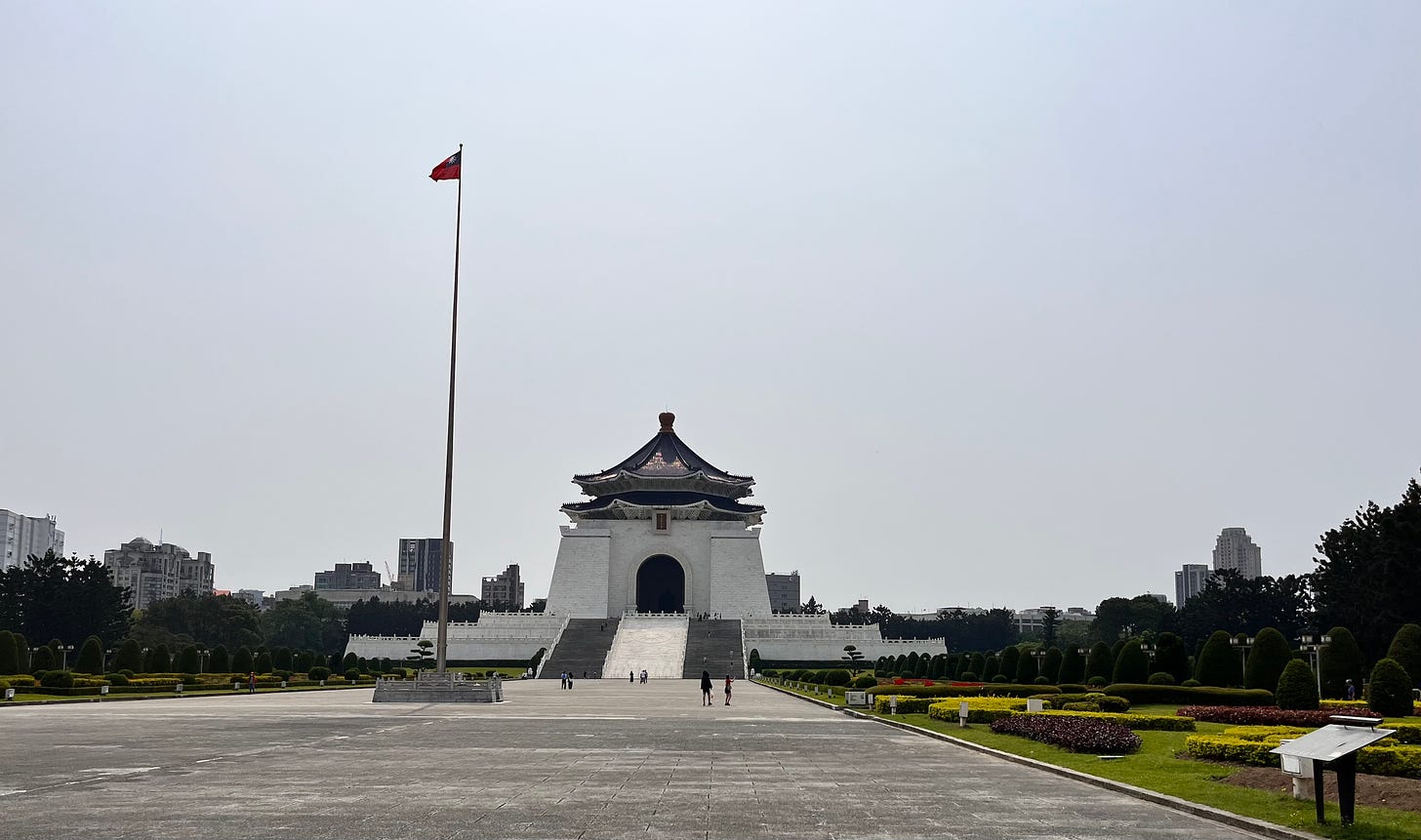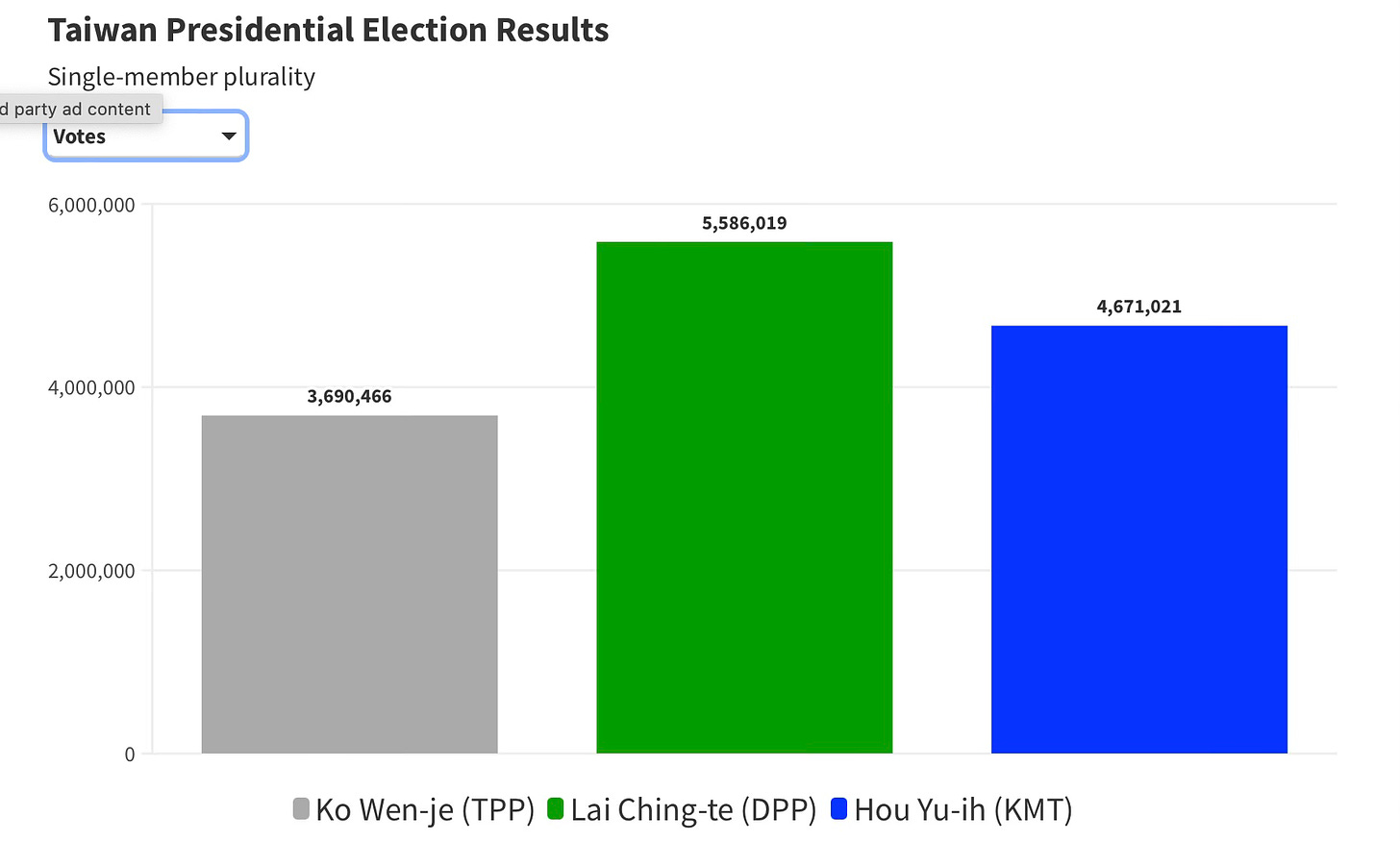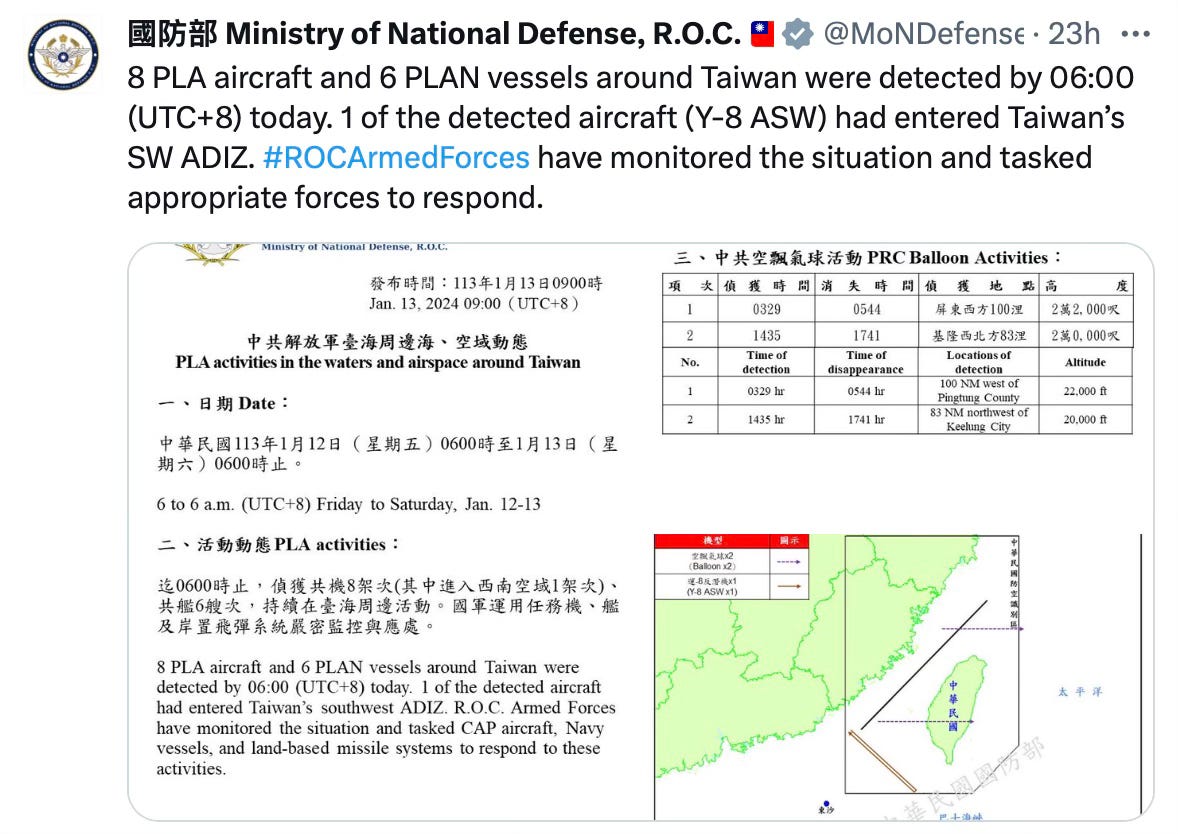Taiwan’s Election – A Quick Look
China is sure to react, and this will pose additional security dilemmas for Western strategists on top of the wars in Ukraine, Gaza and Yemen.
The Taiwanese Presidential election has been run and won.
The election saw Vice President Lai Ching-te of the ruling Democratic Progressive Party (DPP) gain just over 40% of votes cast in yesterday’s election. This ensures an unprecedented third term in power for the DPP His opponents, Hou Yu-ih of the main opposition party the Kuomintang (KMT) and Ko Wen-je of the Taiwan People's Party, received 33.49% and 26.46% of the vote respectively.
Now comes the navigation of the interregnum between election and inauguration in May this year by Taiwan, its friends and partners. The Chinese Communist Party, which despises the policy of the DPP which favours Taiwanese autonomy, is sure to be unhappy.
Chinese President Xi, again, made clear his vision for future Chinese-Taiwanese relations in his New Year’s address. He stated that:
The reunification of the motherland is a historical inevitability. Compatriots on both sides of the Taiwan Strait should be bound by a common sense of purpose and share in the glory of the rejuvenation of the Chinese nation.
China continues to perpetuate its ‘reunification’ narrative even though Taiwan has never been a part of the People’s Republic of China. The initial Chinese response to Lai’s election, provided by Chen Binhua of the Chinese Taiwan Affairs Office noted that the result shows that the DPP doesn’t represent mainstream public opinion on the island.
An initial assessment has also been published by China expert, Bonnie Glasser at the German Marshall Fund blog. She notes that:
Although domestic problems such as stagnating wages and rising housing costs were important to many voters, especially the young, Taiwan’s future relationship with China was likely the paramount concern. In the face of increasing Chinese military and economic pressure, as well as disinformation and other forms of cognitive warfare that are aimed at sowing divisions in Taiwan and persuading the island’s people that their future will be brighter as part of China, the majority of the people want to preserve Taiwan's autonomy as well as cross-strait stability.
As for the trajectory of the China-Taiwan relationship in the wake of this election, Glasser describes how:
It is unlikely, however, that Chinese President Xi Jinping will restart official contacts with Taiwan’s government, which have been suspended for the past eight years. China has labeled Lai and his Vice President-elect, Bi-khim Hsiao, Taiwan’s former representative to the United States, as a “separatist” duo who, if elected, would “only push Taiwan into the abyss”.
You can read the full article from Bonnie Glasser here.
A couple of other wrap up stories about the election are worth reading. As always, the Japan Times has good coverage. You can read their story here.
The Taipei Times is another good resource for coverage of the election and analysis. Their full coverage is available at this link.
Newsweek also published a useful initial analysis after it was clear Lai had won the election. You can read the article here.
There are sure to be a wide range of reactions from China. These are likely to encompass diplomatic, informational warfare, economic coercion and military aggression and other initiatives from the Chinese Communist Party playbook.
Some other resources which focus on military and other security issues related to Taiwan include the following:
Taiwanese Ministry of National Defence. Twitter / X link here.
The Center for Peace and Security, at the Taipei School of Economics, is where Admiral (retired) Lee His-Min (author of the Overall Defence Concept) as is worth checking out.
The Institute for the Study of War regular Taiwan updates are available here.
The Institute for National Defense and Security Research in Taiwan is excellent and worth checking out.
One of my favourite OSINT sites which tracks events around Taiwan, @Detresfa_, is available here.
Finally, the National Institute for Defence Studies in Japan is an excellent resource.
There are many other sources out there which are also terrific. Space prevents me from listing them all.
Taiwan's Presidential election and its aftermath is sure to pose challenges in the coming days and weeks, depending on the severity of the Chinese response. It is just one several major international security challenges facing the West in 2024. The wars in Ukraine against Russia, the war in Gaza and the newly launched campaign against the Houthis require a deft balance of diplomacy, military assistance, strategic influence operations, economic policy and industrial production in the year ahead.







Great stuff. I am not all too familiar with Taiwanese politics, but cannot imagine KMT would be preferable to Xi given the long history and fighting between KMT and the CCP, to understate it. So to me is sounds like 75% of the voters favor autonomy in some form.
So, what is Xi going to do next? His military and defense industries are ripe with corruption (see also Russia) and he may not have what he thought head had. The economy, by recent Chinese standards is tanking and unemployment is reported as being high. So what is his near term play again??
Thank you for the update and for the links to other sources.